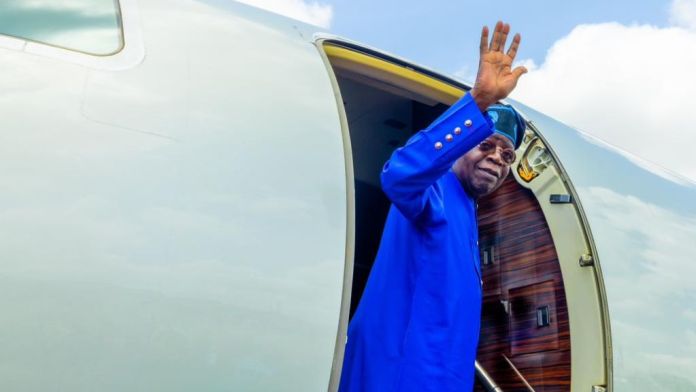
President Bola Tinubu has made his way back to Abuja after completing a three-day official trip to Equatorial Guinea.
Arriving on a Gulfstream jet, the President landed at the Presidential Wing of the Nnamdi Azikiwe International Airport in Abuja around 6.30 pm on Friday.
This visit marked his 22nd international trip since assuming office approximately 15 months ago.
Upon his arrival, Tinubu was welcomed by various top government officials, including Femi Gbajabiamila, his Chief of Staff; George Akume, the Secretary to the Government of the Federation; and Nyesom Wike, the Minister of the Federal Capital Territory, among others.
During his time in Equatorial Guinea, Tinubu and his Equatorial Guinean counterpart, Teodoro Mbasogo, officially signed an agreement concerning the Gulf of Guinea Pipeline Project, further solidifying the partnership for mutual development.
The scope of the agreement encompassed legislative and regulatory measures for the gas pipeline, as well as aspects related to its establishment, operation, transit of natural gas, ownership, and general principles.
In his statements at the agreement signing event, Tinubu emphasized that this new pact would create fresh avenues for gas exploration and job opportunities, highlighting that discussions with President Mbasogo also delved into employment generation, food security, diplomatic relations, and conflict resolution mechanisms across the continent, in a private meeting preceding the signing.
Notably, Tinubu detailed that talks with President Mbasogo included addressing security concerns, the African Continental Free Trade Area, and food security.
During a preceding dinner held in his honor, Tinubu urged African leaders to undertake more strategic and intentional measures to tackle the brain drain of skills and talent from the continent.
He advocated for initiatives such as combating tribalism, recognizing and rewarding merit-based performances, and modernizing outdated judicial systems.
Tinubu questioned, “Why are we confronted with healthcare challenges if our medical professionals cannot find fulfillment within our borders? How can we progress if our judiciary is outdated?”
He asserted, “Tribalism should have no place in our nation or region. It is imperative to fortify our continent, foster peace collectively, and lend support to one another.”
“We must harness our resources for advancement, foster collaborative problem-solving, prioritize research and development, and duly acknowledge and incentivize initiatives in this domain. We should aim to achieve breakthroughs locally, rather than outsourcing or relinquishing them.”
Equatorial Guinea marks the seventh African country where Tinubu has made an official visit. His itinerary has included stops in Paris, France (three times); London, United Kingdom (twice); Bissau, Guinea-Bissau (twice); Nairobi, Kenya; Porto Novo, Benin Republic; Pretoria, South Africa; Accra, Ghana; New Delhi, India; Abu Dhabi and Dubai in the United Arab Emirates; New York, United States of America; Riyadh, Saudi Arabia (twice); Berlin, Germany; Addis Ababa, Ethiopia; Dakar, Senegal and Doha, Qatar.
